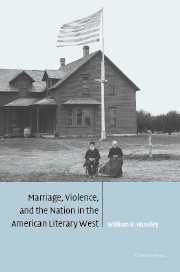Book contents
- Frontmatter
- Contents
- List of illustrations
- Acknowledgments
- Introduction
- 1 Western unions
- 2 Turner's rhetorical frontier
- 3 Marrying for race and nation: Wister's omniscience and omissions
- 4 Polygamy and empire: Grey's distinctions
- 5 Unwedded West: Cather's divides
- 6 Accident and destiny: Fitzgerald's fantastic geography
- 7 Promises and betrayals: Joan Didion and Wallace Stegner
- Afterword
- Notes
- Index
6 - Accident and destiny: Fitzgerald's fantastic geography
Published online by Cambridge University Press: 22 September 2009
- Frontmatter
- Contents
- List of illustrations
- Acknowledgments
- Introduction
- 1 Western unions
- 2 Turner's rhetorical frontier
- 3 Marrying for race and nation: Wister's omniscience and omissions
- 4 Polygamy and empire: Grey's distinctions
- 5 Unwedded West: Cather's divides
- 6 Accident and destiny: Fitzgerald's fantastic geography
- 7 Promises and betrayals: Joan Didion and Wallace Stegner
- Afterword
- Notes
- Index
Summary
“I suppose the latest thing is to sit back and let Mr. Nobody from Nowhere make love to your wife. Well, if that's the idea you can count me out … Nowadays people begin by sneering at family life and family institutions and next they'll throw everything overboard and have intermarriage between black and white.”
Flushed with his impassioned gibberish [Tom] saw himself standing alone on the last barrier of civilization.
“We're all white here,” murmured Jordan.
I see now that this has been a story of the West, after all –
The Great GatsbyIn some of Americans' most durable western stories, idealistic beliefs have often coexisted with accidental or intentional violence, as they do in The Great Gatsby, in which three people are killed in a chain of presumed accident and mistaken revenge. The story of marital misery, betrayal, murder, and suicide would not be so familiar or have become so canonized without the nationally allegorical burden it self-consciously bears through Nick Carraway's rendering of it and through Fitzgerald's intricate verbal weaving of capitalist and historical motifs, especially western ones, from Thomas Jefferson to the Nevada silver fields. Marriage and its constellation of jealousies and conquests is the plot-shaping structure through which Fitzgerald dissects the ways that ethnic and class divisions perpetuate both the romance and violence of American civilization.
- Type
- Chapter
- Information
- Marriage, Violence and the Nation in the American Literary West , pp. 159 - 190Publisher: Cambridge University PressPrint publication year: 2002



